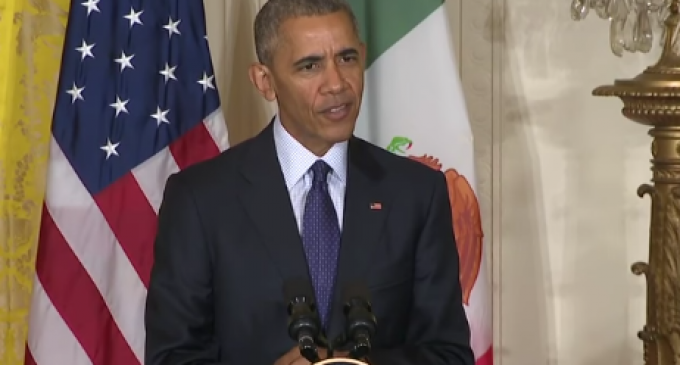
For someone who claims to not ever have paid ransom money to Iran, President Obama is acting very touchy about the matter.
While the administration’s handling of the media furor over the revelation that it paid over a billion dollars in cash and foreign currency over the past year doing little to convince Americans that it did nothing wrong, Congress has moved to prevent similar incidents from happening in the future. To that end, legislators are planning to introduce a new bill that will explicitly prohibit the White House from making “future ransom payments to Iran”.
But of course, Obama is not willing to accept what he sees as a solution to “a problem… that does not exist” (yes, the White House actually said this in an official statement). Indeed, he is preparing to veto the legislation should it find its way to his desk.
Read more on the next page:

You day will come
Obama is an idiot and a fool can’t wait for him and his wife and kids to exit the White House and go into Oblivion I hope
Obama is a criminal and a terrorist
He’s clearing arming Isis to take over the USA during an e.m.p. attack. Isis will survive us wimpy Americans have no chance.. well some of us anyway.
“What does the Bible say about lawlessness?”
Answer: To be lawless is to be contrary to the law or to act without regard to the law. Laws are necessary in a sinful world (1 Timothy 1:9), and those who choose to act lawlessly further sin in the world. The word for “lawlessness” in the Bible is often translated “iniquity.” According to the Bible, the root of all lawlessness is rebellion.
First John 3:4 defines sin as lawlessness: “Everyone who sins breaks the law; in fact, sin is lawlessness.” To commit sin is to be lawless; that is, the sinner breaks God’s law. In this way, lawlessness is a rejection of God. Satan, who models the ultimate rejection of God, will one day empower the Antichrist, called “the lawless one,” whose rise to power “will be in accordance with how Satan works” (2 Thessalonians 2:9).
Lawlessness is contrasted with righteousness in verses such as Romans 6:19, 2 Corinthians 6:14, and Hebrews 1:9. The righteous, who have the nature of Jesus Christ, hate the deeds of lawlessness. Lot, a godly man living in Sodom, “was tormented in his righteous soul by the lawless deeds he saw and heard” (2 Peter 2:8). The psalmist said, “I abhor the assembly of evildoers and refuse to sit with the wicked” (Psalm 26:5). Christians are to be law-abiding (1 Peter 4:15).
When a society ignores the law, lawlessness is the result, and chaos ensues. The time of the judges after Joshua’s death was marked by upheaval, oppression, and general disorder. The biblical historian puts his finger on the reason for the tumult: “In those days Israel had no king; everyone did as they saw fit” (Judges 21:25). The riot in Ephesus is a good example of lawlessness in action (Acts 19). The rioters were confused and unsure even of why they were rioting (verse 32); in their lawlessness, they were ignoring proper legal channels (verse 39) and, of course, breaking the law (verse 40).
God has a purpose for establishing human government: “to punish those who do wrong and to commend those who do right” (1 Peter 2:14). Rulers are God’s appointees to maintain order and promote righteousness in a civil society. “Consequently, whoever rebels against the authority is rebelling against what God has instituted, and those who do so will bring judgment on themselves” (Romans 13:2). In other words, lawlessness is condemned in Scripture.
The Bible connects man’s lawlessness and rebellion against God with his need for God’s forgiveness. In Romans 4:7, Paul (quoting Psalm 32:1) says, “Blessed are those whose lawless deeds are forgiven, and whose sins are covered” (ESV). God’s righteousness is imputed to us at salvation, and God forgives us of our lawlessness: “Their sins and lawless acts I will remember no more” (Hebrews 10:17, quoting Jeremiah 31:34). Christ died on the cross “to redeem us from all lawlessness and to purify for himself a people for his own possession who are zealous for good works” (Titus 2:14, ESV). Our lawless deeds resulted in Christ’s death, but God’s grace overcomes our lawless hearts.
In the judgment many will stand before Christ claiming a connection with Him that exists only in their own minds. They will rehearse their good deeds done in His name, only to hear Jesus declare them to be “workers of lawlessness” whom Christ never knew (Matthew 7:23, ESV). At that time, those who practice lawlessness will be cast “into the blazing furnace,” while those who are covered by the righteousness of Christ “will shine like the sun” (Matthew 13:41–43). Christ will have the ultimate victory and will eliminate lawlessness forever.
Recommended Resource: Bible Answers for Almost all Your Questions by Elmer Towns
Related Topics:
Do Christians have to obey the Old Testament law?
What is hyper-grace?
Does the Bible teach situational ethics?
What is moral relativism?
How can I overcome sin in my Christian life?
Return to:
Topical Bible Questions
Return to:
GotQuestions.org Home
What does the Bible say about lawlessness?
Override
Still a traitor
The whole Administration needs to be changed now
I hope your right, he has an override vote coming up on the the Americans right to hold Saudi Arabia responsible… if they can do that then they can override any executive order and push through new laws needed to stop his dictatorship… I think he needs to answer to where the money came from since he is constantly downgrading payments to Americans
and yet many blame congress he is not a fair person to deal with first part of his term he could not work with Dems either